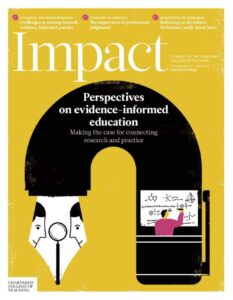I want to see — as I am sure do you — an education system that supports every single pupil to flourish, no matter who they are or where they come from. Yet, too often, we see similar pupils achieve very different results, even within the same schools. It is usually the poorest pupils — those who can’t afford the same out-of-school support that their better-off classmates can — who lose out. The stakes are too high for this to be acceptable any more. If we want to improve outcomes for all students, and increase professional independence, we have to support all teachers to become more evidence-informed. That means making good use of what is already known about effective practice and investing our energy into learning more. This may sound like stating the obvious, but it isn’t just a matter of observing what happens in good schools, labelling it ‘best practice’, and strong-arming everyone into doing it. Schools and classrooms are complex systems, and within them i
Join us or sign in now to view the rest of this page
You're viewing this site as a guest, which only allows you to view a limited amount of content.
To view this page and get access to all our resources, join the Chartered College of Teaching (it's free for trainee teachers and half price for ECTs) or log in if you're already a member.











